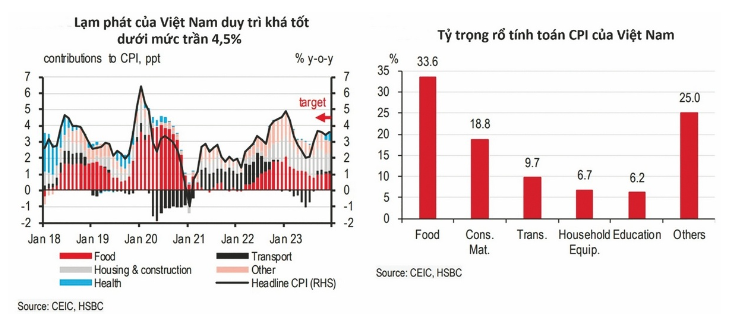The FMCG (Fast Moving Consumer Goods) industry plays an essential role in everyone's life, providing essential products for daily consumption needs. With supply chain disruptions, rising inflation and changing consumer preferences, 2023 is not a “normal” year for the food industry. Therefore, companies need to adapt to current challenges and focus on product innovation, omnichannel sales and sustainable operations to succeed in the future.
However, inflation is a hot issue affecting every aspect of the economy, including the FMCG industry. According to forecasts of reputable organizations such as the World Bank (WB) and the International Monetary Fund (IMF), inflation in Vietnam in 2024 may fluctuate in the range of 4-5%.
This article will analyze the impact of inflation on the FMCG industry and the strategies that businesses can apply to adapt to this new context.

Impact of inflation on the FMCG industry
In 2023, Vietnam will continue to be in the group of countries that control inflation well when the CPI in December 2023 increases by 3,58% compared to December 2022, the average CPI in 2023 increases by 3,25% compared to 2022 and is lower than target 4. ,5% set by the National Assembly; Core inflation increased by 4,16%. From the results achieved in 2023, experts predict that inflationary pressure will not be large in 2024.
Below are some impacts of inflation on the FMCG industry:
Prices increased
Many FMCG brands have relied on price increases to drive growth during inflationary times, but this is unlikely to be sustainable as costs ease next year.
Inflation leads to increased production, packaging and transportation costs, forcing FMCG businesses to increase product prices. This may cause consumers to reduce their purchases or switch to cheaper brands.
When looking in detail, we see that the growth of the FMCG industry in 2022 is driven mainly by an increase in consumer volume and price fluctuations. Of which, the price fluctuation factor contributed 5.8% to total growth. However, it should be noted that price increases also create inflationary pressure in the industry.
While price increases may be difficult for consumers, it means brands have been able to drive increased sales without actually selling more product. But to create sustainable growth, brands will need to persuade consumers to buy more so that sales also increase.
According to analysts, FMCG companies are also expecting expansion of their profit margins with subdued commodity inflation leading to increased spending on brand building, return on promotions to consumers. use and increase dividend payments to their shareholders.
Change shopping habits
When prices rise, consumers may change their shopping habits, such as:
- “Degradation” trend: Consumers tend to switch to cheaper brands or private label products to save costs.
- Selective shopping: Consumers focus on essential products and cut down on non-essential products.
- Increased use of online sales channels: Consumers search for deals and compare prices more easily on online platforms.
According to Kantar Worldpanel, 65% consumers said they are shopping more at low-priced stores and 56% consumers said they are switching to lower-priced brands.
Impact on profits
High inflation can affect the profits of FMCG businesses due to:
- Production costs increased.
- Consumer purchasing power decreased.
According to SSI Research, the after-tax profit of FMCG businesses listed on HOSE in the first quarter of 2024 decreased by 12% compared to the same period last year.
Demand for cheap products
Demand for low-cost products may increase as consumers tighten spending in 2024. FMCG companies may need to focus on developing low-cost products to meet this demand.
Change marketing strategy
FMCG businesses need to change their marketing strategies to attract consumers in 2024:
- Focus on cheap products.
- Enhance promotions and discounts.
- Develop online sales channels.
- Strengthen marketing and advertising, focusing on low-cost products, promotions, and points programs.
|
|
Scenario for 2024
According to experts, inflation will continue to affect the FMCG industry in 2024. FMCG companies need to prepare for the potential impacts of inflation and adjust their business strategies accordingly.
Some strategies that FMCG companies can apply to deal with inflation:
- Increase operational efficiency: Reduce production and distribution costs to offset rising raw material costs.
- Developing low-cost products: Meeting consumer needs in difficult times.
- Focus on emerging markets: Where there is higher growth potential.
- Diversify product portfolio: Minimize risks and increase ability to adapt to changing markets.
- By adopting these strategies, FMCG companies can minimize the negative impact of inflation and maintain growth in 2024.
|
|
Scenario 1: Inflation is controlled, prices gradually stabilize.
- The FMCG industry recovered, consumer purchasing power increased.
- FMCG businesses focus on product innovation, brand development and enhancing sales channels.
Scenario 2: Inflation continues to rise, prices fluctuate strongly.
- The FMCG industry faces many difficulties, businesses have to cut costs and change business strategies.
- Consumers tighten spending, demand for FMCG products decreases.
Inflation is a big challenge for the FMCG industry, but also an opportunity for businesses to innovate and develop. FMCG businesses need effective strategies to adapt to changing consumer behavior and maintain profits during difficult times.
Monitor Bizzi To quickly receive the latest information:
- Facebook: https://www.facebook.com/bizzivietnam
- Linkedin: https://www.linkedin.com/company/bizzi-vietnam/
- Youtube: https://www.youtube.com/@bizzivietnam




